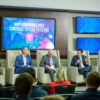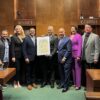Fort Worth Chamber
February 25, 2019
Fort Worth Mayor Betsy Price has a clear vision and presented it last week during her State of the City luncheon produced by the Fort Worth Chamber at the Fort Worth Convention Center.
One Fort Worth is “economic opportunity and prosperity for all, as part of a unified community that finds strength in its diversity….starts by focusing on the issues of poverty, childcare, transportation, education, healthcare and workforce housing.”
In addition, the Mayor managed to break some news during her interview with WFAA Senior Reporter Jason Whitely, heralding a Feb. 28 announcement to end a bottleneck along I-35 in north Fort Worth and the introduction of an online customer service portal called Citibot.
The vision of One Fort Worth includes prospects and goals in the areas of pensions and taxes, neighborhoods, economic development, diversity and prosperity, city services mobility homelessness, childcare and education and health and wellness.
One Fort Worth
Pension and taxes
Fort Worth is on track –the vote is upon us — to be the first big city in Texas to find a pension solution locally, solving a $1.6 billion unfunded liability. “I feel good about this,” Price said. She also said the 2018 bond projects, approved by 81 percent of voters, are on-schedule, within budget and that all arterial roadway projects are under contract for design. “We promised to complete these in four years; that’s a big win, folks.”
Though Fort Worth has reduced its tax rate seven cents in three years, Price said, “we have the highest tax rate in the state. Our tax base is 36 percent commercial and 64 percent residential, too much a burden on residential.” A major focus of the city’s strategic plan, released a year ago, is to increase the commercial tax base with larger businesses, whether recruited or grown internally.
Neighborhoods
“We must see that no neighborhood is ignored.”
Stop Six, the first neighborhood to receive funds as part of the city’s Neighborhood Improvement Plan, has seen a 48% increase in permitting activity, 25% decrease in crimes against property and 53% decrease in crimes against society, according to the city’s data. During 2019, the North Side will see a $3 million investment.
This spending “increases valuations, increases pride and allows children to go to quality neighborhood schools,” Price said.
Economic Development
Economic development: The city is working with the Chambers, Visit Fort Worth and the business community to 1) attract new companies and 2) support existing companies looking to expand. She mentioned Amazon Air and Bell/Uber Elevate as highlights of Fort Worth’s emerging technology and innovation hubs. According to Price, Amazon Air will be the company’s largest facility.
Pension and taxes
Price’s focus centers around initiatives to tackle socio-economic issues that are key to prosperity and opportunity for all, initiatives such as public health, criminal justice, transportation and education.
About the Race and Culture Task Force recommendations delivered to City Council in December, she said, “the city is definitely committed; we estimate a $3 million cost. It’s not perfect, but it’s a great start.”
She said an equity officer would be hired and decisions would be data driven.
City Services
Fort Worth had the second largest drop in overall crime and the largest drop in violent crime, according to the Brennan Center for Justice at New York University of Law 2018 Crime Statics for the 30 largest U.S. cities.
During March or April, Price said the city would begin Citibot, an online customer service tool that will enable citizens to text the city with an address and complaint (potholes, trash, etc.) Citizens will receive an immediate response with notification of receipt, an estimation on the repair and a notification when the request is completed.
She said the Water Department ranks No. 12 nationally for water quality, according to J.D. Power and Associates.
In January, the Planning and Development departments debuted the X Team online, an expedited team for complex projects that drastically speeds up the review process.
And the Fort Worth Library will be open an additional 2,016 hours per year without spending additional taxpayer funds.
Mobility
Price broke some news with this expected Feb. 28 announcement: “My friend Bruce Bugg, who is chairman of TxDOT, has promised that we will have plenty [of funds] in place for 3C, the last leg.” 3C is the final two-lane segment of I-35, the eight miles from US 81/287 to Eagle Parkway north of 820. It has been described as the worst bottleneck in Texas.
TEXRail was delivered on-time and under budget, she said, and potential expansion south could include the Medical District and TCU.
Homelessness
The city has allocated $5.6 million for permanent supportive housing and housed 181 veterans in 100 days working with Tarrant County Homeless Coalition.
The Mayor said collaborative partnerships make a true difference. The Morris Foundation has offered a dollar-to-dollar lead gift of public investments to provide 224 units of permanent supportive housing. And First Presbyterian Church has pledged $1 million toward the development of permanent supportive housing units.
Childcare and education
Read Fort Worth has entered its second phase and needs to average 9.3 percent growth each year to reach the goal of 100 percent of third graders reading at grade level by 2025.
Price also said the Lena Pope-UNTHSC collaboration for workplace childcare could be a model for many other businesses. It is an example for the launch of a city-wide blueprint “Creating Great Places and Spaces for Kids” in collaboration with foundations, the Early Learning Alliance, Tarrant County Workforce Solutions, parents and others. The City of Fort Worth’s first project will be an investment of $500,000 to support the renovation and expansion of the Child Care Associates’ Gragg Child Development Center in United Riverside.
Health and wellness
In November, Fort Worth became the largest Blue Zones Community in the U.S. “It makes you a more attractive city,” Price said. She said FitWorth continues to move the needle on childhood obesity with a six percent decrease.
By the numbers
- 82% of Fort Worth residents drive alone to work, 11% carpool, 1% walk or bike and 1% take transit.
- In 2014, the Gallup well-being index rated Fort Worth 185th out of 190 cities. Today, it is 58th.
- 35% of FWISD third-graders are reading at grade level. The goal is 100 percent by 2025.
- The last two years, Fort Worth has seen a 62% increase in the number of quality-rated childcare centers.
- Fort Worth is ranked second among U.S. cities in the percentage of families with children – more than 38% percent.
- FW infant mortality rate is 6.7 deaths per 1,000, above the national average of 5.9.








